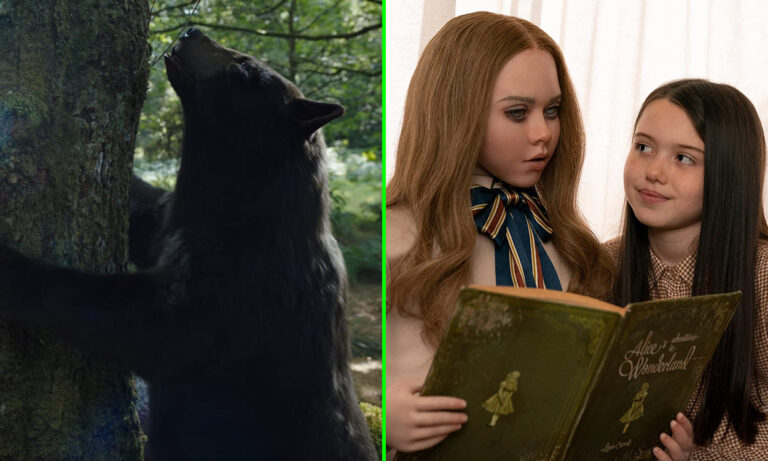Oscars who? Memeable movies like Cocaine Bear and M3GAN bring uncomplicated fun back to the big screen

You know what’s coming this Sunday. The most important night on the film calendar arrives, the Academy Awards. Ahead of the glittery Oscars 2023 ceremony, I expected my social media feed to be full of tweets and predictions over which films will take home awards. Perhaps even speculation over who or what the stars of the silver screen will be wearing on the red carpet.
But that’s not totally been the case. In fact, the film taking up the most space on my timeline right now is Cocaine Bear, a movie about—you’ve guessed it—a bear who stumbles across cocaine in the woods and goes on a murderous rampage. Directed by Elizabeth Banks, the much-memed film is actually based on a true story. And even more surprisingly, it has a favourable score of 73 per cent on Rotten Tomatoes.
Mainstream film is embracing a sense of novelty right now. January saw the release of M3GAN, a dark comedy-meets-horror film about a murderous robot who could sing, dance and kill. M3GAN came to slay, both literally and figuratively, and the film’s commercial and critical success has already sparked plans for a sequel.
A film like Avatar: The Way of Water (which has been nominated for four Academy Awards this year) also feels connected to this. Before any of its cinematic achievements, the film felt like a huge spectacle that couldn’t be missed.
As I sat with 3D glasses on and watched a bunch of weirdly sexualised blue aliens shoot guns at each other and call each other “bro” in American accents, I felt like I was having an out-of-body experience. I knew what I was watching was completely ridiculous and silly at times: with billions of dollars and a decade to make the sequel, the villain James Cameron settled on was a clone of the villain from the first film. Was that really the best he could do? But, against all my instincts, I found myself being drawn in by it and thoroughly entertained from start to finish.
When it comes to Cocaine Bear and M3GAN, it feels like two important shifts are happening. First, is that studios and audiences are gravitating back towards concepts which, on the face of things, seem bizarre—remember Snakes on a Plane or The Human Centipede? But also, more importantly, when these films impress audiences and critics, they subvert our expectations of seriousness and its relationship with quality.
I wonder if, with the economy struggling, the planet burning, and good news headlines constantly getting buried under a never-ending avalanche of negativity, the film industry’s relationship with spectacle might be a form of escapism. This might also be part of the reason why we’re seeing a resurgence of rom-coms—a genre which tends to be uplifting and doesn’t adhere to traditional expectations of realism.
Clarisse Loughrey, film critic at The Independent, thinks there could “definitely” be an economic connection between now and the Reagan era in the 1980s, where an emphasis on profit coincided with challenging economic times for ordinary people. “The Reagan era was so profit-orientated,” she told SCREENSHOT. “If you look back to the early days of the blockbuster, you will see a lot of these novelty-style movies.”
Loughrey also thinks these films are courting social media reactions, which can now be the most effective way to promote a movie. Some fans are more likely to go and see a picture that everyone is posting about, even if it’s not bound to be Oscar-nominated. “Social media is a major factor in creating buzz for these movies,” she explained.
“The audience makes memes and it basically does the promotional work for the studios,” Loughrey continued. This is further evidenced by the incessant memeing of Morbius, a satirical approach that had such a chokehold on the internet that Sony Pictures got tricked into giving the film a second run in theatres.
There could be even more time-sensitive factors at play. The dominance of Marvel films in the blockbuster space is starting to fade, with fan enthusiasm waning and the plots becoming more entangled and complicated (does anyone truly understand the multiverse?). “The apparent drop in Marvel’s box office receipts could suggest that people are losing enthusiasm for the superhero model and are starting to look elsewhere,” Loughrey said.
“A-list stars don’t really have the box office pull they used to, so what is now going to get butts on seats? Horror has always been pretty reliable—but I think you could argue that the concepts behind Cocaine Bear and M3GAN are strong enough to work as a draw in themselves.”
The time of year that films like Cocaine Bear and M3GAN are catching our attention also feels notable here. 2023’s awards season felt fairly lacklustre until Ariana DeBose’s viral performance at the BAFTA Film Awards injected some much-needed fun.
“Angela Bassett did the thing” traded on a similar sense of novelty and spectacle, which was a marked contrast to the stiff awards ceremony where it was performed. It’s probably the only thing people will remember from the BAFTAs this year—but isn’t that rather telling? Against the serious backdrop of awards season, audiences are craving uncomplicated fun.
It’s difficult to know where film’s embrace of novelty will go next. Right now, there is clearly a space for simple, in-your-face concepts which are well-executed and don’t demand too much from the viewer. Brash films like Cocaine Bear don’t claim to be changing the face of cinema. But they are still defying expectations, both critically and commercially. So, in their own purposefully ridiculous way, they actually might be.




